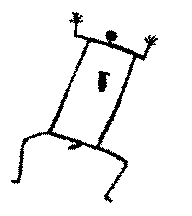When good persons hear of the way
they do their best to practice it.
When average persons hear of the way
they like to talk about it.
When lesser persons hear of the way
they disparage it by calling it godless or foreign.
If there were no derision, it would not be the way.
They say the true way,
compared to the light, often looks the darkest;
forward often looks like it goes backward;
flattest often looks the hilliest.
The best looks like the worst,
the clearest is the most obscure,
the most satisfying looks too little,
the strongest looks the weakest,
the most natural looks old and artificial.
The largest circle has no curves
great abilities take the longest to develop
the finest music has the faintest notes
the universe has no shape
the way is hidden, has no name, no map.
How can it? It is everywhere.
|
In the history of the history of religion there are many theories about the
origin and evolution of religion. Nineteenth century european scholars
considered polytheism a more primitive form of religion than monotheism,
assuming belief in a father sky god to be more philosophically mature
than believing in a mother earth
goddess. As male monotheists, the scholars didn't figure atheism, polytheism,
or goddess worship into their evolutionary
plans of religion. Belief in fewer gods was considered more mature -- from
polytheism to monotheism, though they never went from one to zero god.
There are specialized words in the study of religion that help understand
some of the different social values and the inherent subdividing that
occurs in academia.
Daoism is considered a monism because it asserts that all reality is one
but not a god or being -- the dao. Theism is the belief/experience of a
god/dess with whom a human being can develop a relationship.
Deism is the belief that a god/dess was indeed responsible for the creation of the universe, but like a clockmaker, wound the universe up,
got it going, and is no longer in personal contact with its creation.
Monotheism asserts that there is one god/dess -- a sentient being -- that is
responsible for the manufacture of the
universe. Polytheism asserts that two or more god/desses exist. Dualism
asserts that there are two basic moral forces in the religious universe,
good and evil, that struggle against and with each other. Pantheism is the
belief that god/dess is everything-
-in sum and in whole. Panentheism is a new word within theism for the
belief that the spirit of god/dess is in
everything. Shamanism is a word for native religion led by men and women,
known as shamans, with special powers to know the deeper truths and to heal
with them. Paganism refers to religious beliefs that focus on the earth's natural cycles, elements and forces.
|
